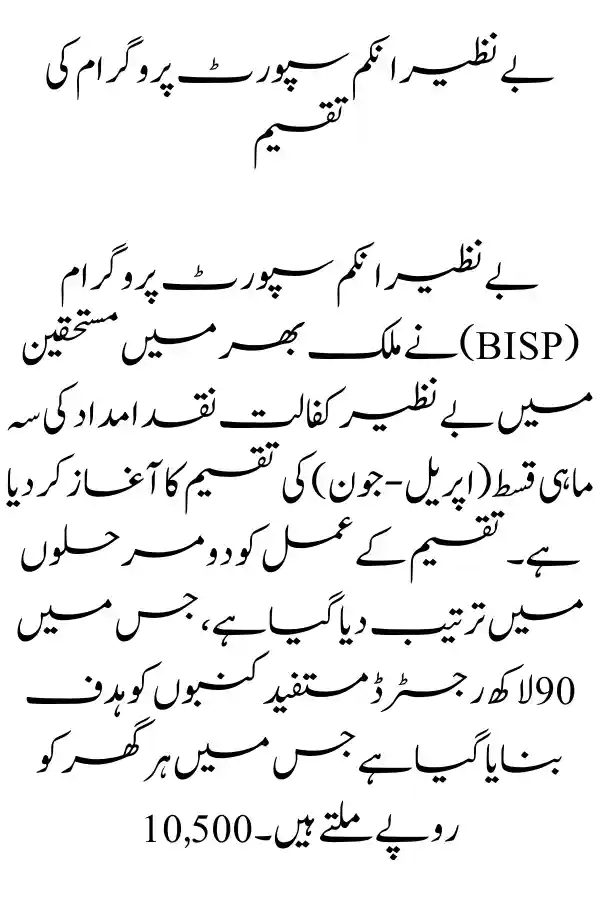Benazir Income Support Programme Disbursement
Benazir Income Support Programme Disbursement The Benazir Income Support Programme (BISP) has commenced the distribution of the quarterly tranche (April-June) of Benazir Kafaalat cash assistance to beneficiaries nationwide. The disbursement process is structured into two phases, targeting over nine million registered beneficiary families with each household receiving Rs. 10,500.Also Read:Applying for Kisan Card Online in Pakistan
Benazir Income Disbursement 2024
In 2024, the Benazir Income Support Programme (BISP) has announced significant updates regarding the disbursement of financial aid. The government has increased the quarterly stipend to better support the most impoverished families amid rising living costs. Beneficiaries can now receive their payments through a more efficient digital payment system, reducing delays and ensuring transparency. The updated eligibility criteria continue to focus on women from low-income households, with a special emphasis on widows, orphans, and persons with disabilities. Additionally, BISP has introduced new measures to combat fraud and ensure that funds reach the intended recipients promptly. This latest development underscores the government’s commitment to improving social welfare and reducing poverty in Pakistan.
Benazir Income Support Programme
The latest update on Benazir Income Support Programme (BISP) disbursement for 2024 involves a pilot program. BISP is partnering with banks to create “BISP Sahulat Accounts” for beneficiaries in Karachi and Lahore. These accounts aim for smoother electronic transfers of the usual cash assistance. If successful, the program will expand to other cities.
Disbursement Phases and Coverage
Phase One
The first phase focuses on beneficiaries in the following regions:
- Islamabad Capital Territory
- Balochistan
- Azad Jammu and Kashmir
- Gilgit Baltistan
- Khyber Pakhtunkhwa: Peshawar, Mardan, and all districts of Malakand and Hazara Division
- Sindh: All districts of Karachi Division and District Hyderabad
- Punjab: Gujranwala, Sahiwal, Rawalpindi, and all districts of Sargodha Division and District Vehari

Quick Details
| Phase | Regions Covered | Target Beneficiaries | Assistance Amount per Household |
|---|---|---|---|
| Phase One | Islamabad, Balochistan, Azad Jammu and Kashmir, Gilgit Baltistan, Khyber Pakhtunkhwa (Peshawar, Mardan, Malakand, Hazara), Sindh (Karachi, Hyderabad), Punjab (Gujranwala, Sahiwal, Rawalpindi, Sargodha, Vehari) | Over nine million families | Rs. 10,500 |
FAQs
1. What is the Benazir Income Support Programme (BISP)?
Benazir Income Support Programme Disbursement BISP is a social safety net program in Pakistan aimed at providing financial assistance to low-income families to alleviate poverty and promote equitable economic growth.
2. How much financial assistance is provided under the Benazir Kafaalat scheme?
Each registered beneficiary household receives Rs. 10,500 per quarter.
3. How are the payments being distributed?
The payments are distributed in two phases, covering different regions in each phase to ensure an organized and efficient disbursement process.
4. Who is eligible for the Benazir Kafaalat cash assistance?
Eligible families are those registered under BISP based on predefined criteria that assess their financial needs and socio-economic status.
5. How can beneficiaries access their payments?
Beneficiaries can access their payments through designated payment centers and authorized financial institutions.
Final Words
The BISP’s initiative to disburse the quarterly tranche of Benazir Kafaalat cash assistance underscores its commitment to supporting low-income families across Pakistan. By organizing the disbursement in phases, BISP ensures that the financial aid reaches the beneficiaries efficiently and promptly, addressing their immediate financial needs and contributing to poverty alleviation.
